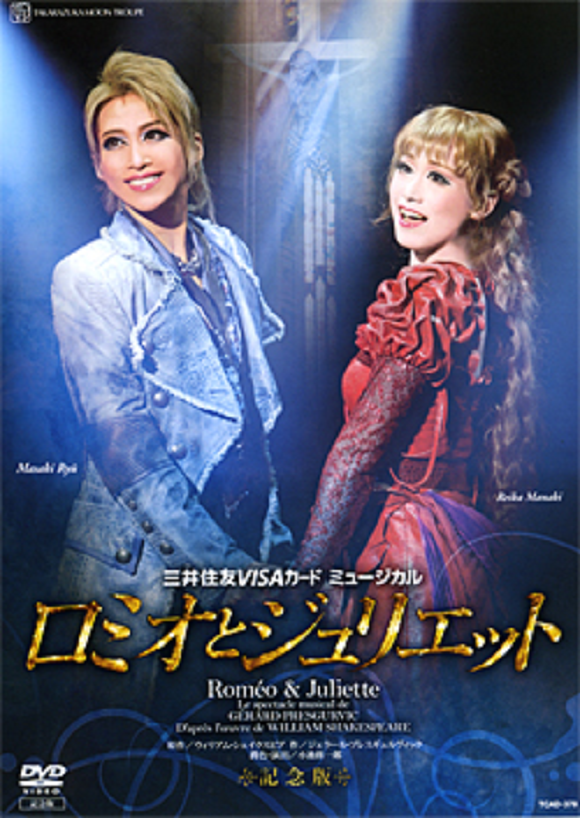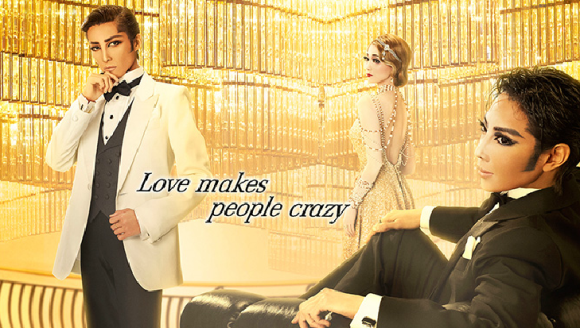Since its first performance 100 years ago, Japan’s Takarazuka Revue has been the country’s most respected theater company. While the troupe is known for its lavish costume and set designs, as well as its bombastic musical performances, its most distinctive characteristic is that the group is composed entirely of actresses, with women playing both male and female roles.
To their fans, Takarazuka actresses are the epitome of grace and poise. There are a lot of pitfalls that have to be avoided to maintain that pristine image, though, as shown by the company’s list of the 25 marks of ugly women.
Recently, a number of former Takarazuka actresses were interviewed on the NHK morning talk show Asa Ichi. Among those who appeared was Mizuki Hashimoto, who has gone on to a career in acupuncture since leaving the stage.
Like many respected organizations in Japan, Takarazuka takes its traditions very seriously, and has established several of them in the century since it came into being. Hashimoto explained that the company has a set of 25 things that make a woman ugly, which veterans of the troupe pass down to new members.
Let’s take a look at the list, which states that ugly women:
1. Never smile
2. Never say ‘thank you’
3. Never say something tastes good
4. Have no energetic spark
5. Have no confidence
6. Complain
7. Have no hope or faith in their hearts
8. See the negative in everything around them
9. Don’t know they are ugly
10. Speak in a small, timid voice.
11. Let themselves get hurt over trivial things
12. Are jealous of others
13. Have no light in their eyes
14. Smirk
15. Shift blame to others
16. Hold grudges
17. Look at everything in a tragic light
18. Either can’t or choose not to realize when they have a problem
19. Don’t give their all for others
20. Don’t trust others
21. Have no desires in their personal life or career
22. Are boastful and lack humility
23. Don’t accept advice
24. Assume they’re always right
25. Darken the mood just by being present.
We have to admit, none of these sound particularly appealing. Even Number 3, never saying something tastes nice, can be a downer for those around you if your standards are so high you can never show any joy in social dining situations.
A couple of these seem like a bit of a paradox, though. For example. Number 9 tells us that ugly women don’t realize they’re ugly. Of course, women who aren’t ugly, by definition, don’t realize that. What’s more, if we accept that not realizing you’re ugly makes you that way, shouldn’t it follow that doing the opposite, realizing you are ugly, makes you, in fact, not ugly? Wait, my brain hurts…
So wait, does this mean no one’s ugly, or everyone is?
Number 17, taking a tragic outlook on life, also seems just a teeny bit hypocritical, considering that many of Takarazuka’s best-loved plays are romantic tragedies.
▼ Takarazuka’s production of Romeo and Juliet is not a wackily reimagined comedy.
▼ Nor does this look particularly cheery
Overall though, most of the items on the list make sense. As a matter of fact, taken as a whole, it’s such good advice that saying it’s for those aspiring to be beautiful seems like an unnecessary limitation, as does dumping all of these maxims on one side of the gender line.
It’d be a lot more accurate to say these are simply 25 things to avoid if you want to be a good person, regardless of whether you’re a woman or a man (or just play one on the stage).



 All-female Final Fantasy musical stage play coming from Japan’s Takarazuka troupe
All-female Final Fantasy musical stage play coming from Japan’s Takarazuka troupe Japan’s all-female Takarazuka theater has enlightened 31.5:1 female to male bathroom stall ratio
Japan’s all-female Takarazuka theater has enlightened 31.5:1 female to male bathroom stall ratio Anime music legend Yoko Kanno to compose music for Japan’s Takarazuka all-female revue
Anime music legend Yoko Kanno to compose music for Japan’s Takarazuka all-female revue Rurouni Kenshin comes to picture-perfect life as photos of stage musical’s cast are released
Rurouni Kenshin comes to picture-perfect life as photos of stage musical’s cast are released Takarazuka musical theater fans might be the nicest in the world, according to Japanese Twitter
Takarazuka musical theater fans might be the nicest in the world, according to Japanese Twitter Tokyo Tsukiji fish market site to be redeveloped with 50,000-seat stadium, hotel, shopping center
Tokyo Tsukiji fish market site to be redeveloped with 50,000-seat stadium, hotel, shopping center Japanese ramen restaurants under pressure from new yen banknotes
Japanese ramen restaurants under pressure from new yen banknotes McDonald’s new Happy Meals offer up cute and practical Sanrio lifestyle goods
McDonald’s new Happy Meals offer up cute and practical Sanrio lifestyle goods Sakura tree falls on man at Sannenzaka near Kiyomizu temple in Kyoto 【Breaking News】
Sakura tree falls on man at Sannenzaka near Kiyomizu temple in Kyoto 【Breaking News】 Beautiful Red and Blue Star luxury trains set to be Japan’s new Hokkaido travel stars
Beautiful Red and Blue Star luxury trains set to be Japan’s new Hokkaido travel stars Mt. Koya planning to instate visitor’s tax to cope with huge tourist numbers
Mt. Koya planning to instate visitor’s tax to cope with huge tourist numbers New private rooms on Tokaido Shinkansen change the way we travel from Tokyo to Kyoto
New private rooms on Tokaido Shinkansen change the way we travel from Tokyo to Kyoto French Fries Bread in Tokyo’s Shibuya becomes a hit on social media
French Fries Bread in Tokyo’s Shibuya becomes a hit on social media A trip to hell on Japan’s ‘vomit ship’: Is it as bad as everyone says it is?
A trip to hell on Japan’s ‘vomit ship’: Is it as bad as everyone says it is? We tried Korea’s way-too-big King Tonkatsu Burger at Lotteria 【Taste Test】
We tried Korea’s way-too-big King Tonkatsu Burger at Lotteria 【Taste Test】 All-you-can-drink Starbucks and amazing views part of Tokyo’s new 170 meter-high sky lounge
All-you-can-drink Starbucks and amazing views part of Tokyo’s new 170 meter-high sky lounge More foreign tourists than ever before in history visited Japan last month
More foreign tourists than ever before in history visited Japan last month Starbucks reopens at Shibuya Scramble Crossing with new look and design concept
Starbucks reopens at Shibuya Scramble Crossing with new look and design concept Studio Ghibli releases new action figures featuring Nausicaä of the Valley of the Wind characters
Studio Ghibli releases new action figures featuring Nausicaä of the Valley of the Wind characters Studio Ghibli glasses cases let anime characters keep an eye on your spectacles
Studio Ghibli glasses cases let anime characters keep an eye on your spectacles Is the new Shinkansen Train Desk ticket worth it?
Is the new Shinkansen Train Desk ticket worth it? Beautiful Ghibli sealing wax kits let you create accessories and elegant letter decorations【Pics】
Beautiful Ghibli sealing wax kits let you create accessories and elegant letter decorations【Pics】 Studio Ghibli releases Kiki’s Delivery Service chocolate cake pouches in Japan
Studio Ghibli releases Kiki’s Delivery Service chocolate cake pouches in Japan New definition of “Japanese whiskey” goes into effect to prevent fakes from fooling overseas buyers
New definition of “Japanese whiskey” goes into effect to prevent fakes from fooling overseas buyers Our Japanese reporter visits Costco in the U.S., finds super American and very Japanese things
Our Japanese reporter visits Costco in the U.S., finds super American and very Japanese things Studio Ghibli unveils Mother’s Day gift set that captures the love in My Neighbour Totoro
Studio Ghibli unveils Mother’s Day gift set that captures the love in My Neighbour Totoro Domino’s Japan now sells…pizza ears?
Domino’s Japan now sells…pizza ears? New Japanese KitKat flavour stars Sanrio characters, including Hello Kitty
New Japanese KitKat flavour stars Sanrio characters, including Hello Kitty New Pokémon cakes let you eat your way through Pikachu and all the Eevee evolutions
New Pokémon cakes let you eat your way through Pikachu and all the Eevee evolutions Sales of Japan’s most convenient train ticket/shopping payment cards suspended indefinitely
Sales of Japan’s most convenient train ticket/shopping payment cards suspended indefinitely Sold-out Studio Ghibli desktop humidifiers are back so Totoro can help you through the dry season
Sold-out Studio Ghibli desktop humidifiers are back so Totoro can help you through the dry season Japanese government to make first change to romanization spelling rules since the 1950s
Japanese government to make first change to romanization spelling rules since the 1950s Ghibli founders Toshio Suzuki and Hayao Miyazaki contribute to Japanese whisky Totoro label design
Ghibli founders Toshio Suzuki and Hayao Miyazaki contribute to Japanese whisky Totoro label design Doraemon found buried at sea as scene from 1993 anime becomes real life【Photos】
Doraemon found buried at sea as scene from 1993 anime becomes real life【Photos】 Tokyo’s most famous Starbucks is closed
Tokyo’s most famous Starbucks is closed One Piece characters’ nationalities revealed, but fans have mixed opinions
One Piece characters’ nationalities revealed, but fans have mixed opinions We asked a Uniqlo employee what four things we should buy and their suggestions didn’t disappoint
We asked a Uniqlo employee what four things we should buy and their suggestions didn’t disappoint Princesses, fruits, and blacksmiths: Study reveals the 30 most unusual family names in Japan
Princesses, fruits, and blacksmiths: Study reveals the 30 most unusual family names in Japan Takarazuka, Japan’s all-woman theater troupe, is producing a musical about Abe Lincoln
Takarazuka, Japan’s all-woman theater troupe, is producing a musical about Abe Lincoln Our reporter breaks her Takarazuka virginity with an all-female performance of City Hunter
Our reporter breaks her Takarazuka virginity with an all-female performance of City Hunter Takarazuka becomes fourth Japanese municipality to recognize same-sex partnerships
Takarazuka becomes fourth Japanese municipality to recognize same-sex partnerships Tokyo Olympics comes to a close with anime opening ska remix at closing ceremony 【Video】
Tokyo Olympics comes to a close with anime opening ska remix at closing ceremony 【Video】 Shigeru Miyamoto’s reason for not creating Wario and Waluigi’s love interests is… kind of mean?
Shigeru Miyamoto’s reason for not creating Wario and Waluigi’s love interests is… kind of mean? Nations-as-pretty-boys anime Hetalia’s live-action cast appears in costume 【Photos】
Nations-as-pretty-boys anime Hetalia’s live-action cast appears in costume 【Photos】 Resident Evil/Biohazard games get stage musical in September
Resident Evil/Biohazard games get stage musical in September Hello Kitty takes to the stage for the Sanrio musical【Photos】
Hello Kitty takes to the stage for the Sanrio musical【Photos】 Ultra-violent post-apocalyptic anime Fist of the North Star is becoming a stage musical in Tokyo
Ultra-violent post-apocalyptic anime Fist of the North Star is becoming a stage musical in Tokyo Japan has more anime/video game actresses than ever before, according to major seiyu magazine
Japan has more anime/video game actresses than ever before, according to major seiyu magazine 8 Japan-related events to look forward to in 2016!
8 Japan-related events to look forward to in 2016! Survey asks Japanese women if they could marry a man who’s rich but ugly
Survey asks Japanese women if they could marry a man who’s rich but ugly
Leave a Reply